What do users think about paperless technologies: survey results
 Being engaged in the development and implementation of the electronic archive system , we pay great attention to the dialogue with users. So, last year we conducted a survey “ What do users think about paperless technologies? , Whose main goal was to analyze the attitude of Russian users to paperless document handling technologies.
Being engaged in the development and implementation of the electronic archive system , we pay great attention to the dialogue with users. So, last year we conducted a survey “ What do users think about paperless technologies? , Whose main goal was to analyze the attitude of Russian users to paperless document handling technologies.Links to the survey were placed in our blog on Habré, in a blog on LiveJournal, as well as on the specialized portal ElArchivo.
The total number of respondents was 319 people. Our questions were answered by specialists in various fields: programmers, translators, accountants, journalists, university professors ... We express our sincere thanks to all who participated in the survey and expressed their comments in the comments.
Facts and Figures
- in 54% of organizations where our respondents work, paperless technologies are not fully used: software for electronic document management / electronic storage of documents is installed, but work with most documents is carried out in paper form;
- 30.5% of respondents note that in their organizations no software is used at all for working with electronic documents;
- 70.4% of respondents say that they would like to work with all documents electronically
- Only 3.1% of respondents believe that all documents of enterprises and organizations should have paper copies.
- 33.7% of respondents believe that a transfer to a fully paperless office is possible
- 68.4% consider stupidity, laziness and greed to be the main obstacles on the way to paperless workflow.
')
Comments
The statistics we obtained are quite typical for the period when paper documents were not completely gone (and probably would not be) in the past. Our results practically do not differ from the results of a similar survey conducted by the French company Generix Group : just like our Russian respondents, the French associate high hopes with paperless technologies, but at the same time remain committed to paper that is more familiar and in many cases inspiring greater confidence.
It is quite possible that due to a number of reasons in our country much greater hopes are placed on electronic document circulation than in European countries. In Russia, unlike most European countries, where mail works like a clock and there are no problems with the delivery of paper documents, the situation is exactly the opposite. The transition to electronic document management and electronic storage of documents is considered by many to be the only panacea for delays that are so inevitable when working with paper. It is a time saving that 80.6% of the respondents consider the only advantage of paperless technologies.
In the comments to the survey and to our post on Habré, many said that the specific Russian problem (although, judging by the publications, this problem exists not only in Russia) is currently the inability to ensure a balance between paper and electronic documents. It often happens that all electronic documents have to be duplicated on paper, and it is the latter that are of paramount legal importance in this case. There is no need to go far for examples: it is enough to recall the well-known site gosuslugi.ru. Unfortunately, the work to solve this problem in few places is conducted properly.
The survey shows that specialized software for working with electronic documents in Russia is installed in a very small number of organizations: electronic document management systems are installed at work in 28.4% of our respondents, electronic archive systems - in 5.3%. In their professional activities, 10.5% use ECM systems with document flow and document storage modules, 22.5% use various collaboration tools (Dropbox, GoogleDocs, etc.). A sufficiently large share of respondents (30.5%) has no software for working with electronic documents at all.
Which of the following types of software is used to store documents and work with them in your organization?
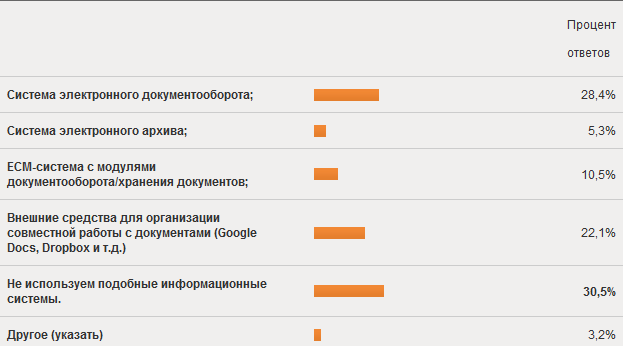
In our opinion, the low percentage of use of specialized software is due to the fact that:
- electronic document management and electronic document storage systems are quite expensive, and not every organization can afford them
- Russian users are not well informed about paperless technologies.
- Most of the organizations (especially state-owned) work with documents for older people who find it difficult to restructure and stop thinking in "paper" categories.
Despite the fact that there are still few users of software for working with electronic documents in Russia, many of our respondents actively perform various work operations without using paper: 64.5% regularly check the status of bank accounts via the Internet, 59.1% order equipment, 54.8% - office supplies; 54.8% give tax returns, 48.4% pay for mobile communications and the Internet, 45.2% buy air and railway tickets, 44.1% exchange documents with counterparties.
23.7% regularly use the Internet to contact the state authorities.
Which of the following operations in your organization are carried out regularly via the Internet?
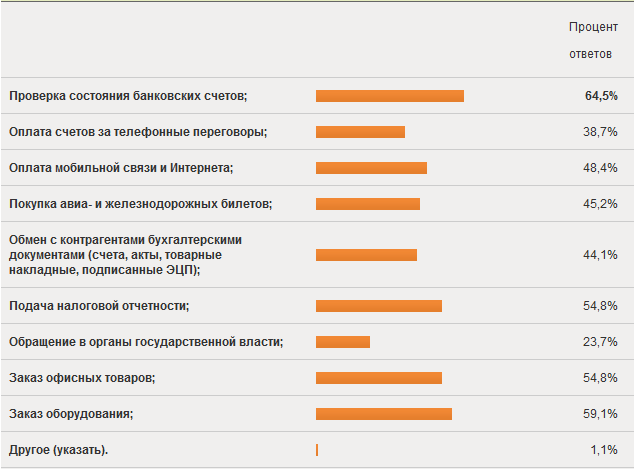
70.4% of respondents quite agree that the work with all documents of the organization can be carried out in electronic form. 23.5% of respondents agree to work in electronic form only with everyday documents such as acts, invoices, etc. Only 3.1% of respondents believe that all documents of enterprises and organizations should have paper duplicates. In a more visual form, the spectrum of opinions on this issue is presented in the figure below:
Do you agree that all the documents with which you have to work, exist only in electronic form?
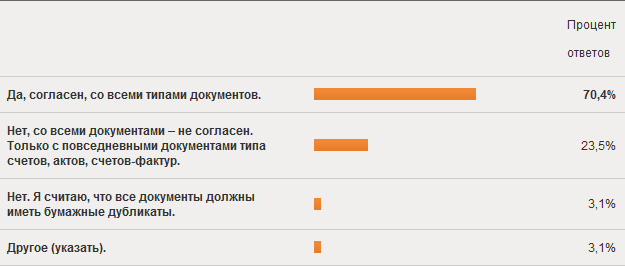
The undoubted advantages of electronic document management and electronic storage are respondents consider time saving (80.6%), saving money (73.5%), increasing work productivity (73.5%), saving space (79.6%), the possibility of organizing collaboration (74.5%). Among other benefits are also called the simplification of work with documents (68.4%), a higher level of security of documents from unauthorized access (39.8%). Very many (52%) one of the important advantages of the transition to paperless technology is called paper saving and protection of forests from deforestation.
What do you think is the advantage of using paperless technology?

On the question of whether or not a complete transition to paperless technologies is possible in the near future, opinions are divided. 33% of respondents believe that such a transition is quite possible; 25.5% - which is impossible, as the paper continues to play a significant role in our life. 17.3% believe that Russia can switch to paperless technologies only by the relevant order of the President of the Russian Federation. Another 17% think that the transition is quite possible, but not in Russia. This picture is quite understandable for the reasons described above.
Do you think the transition to a fully paperless office is possible?
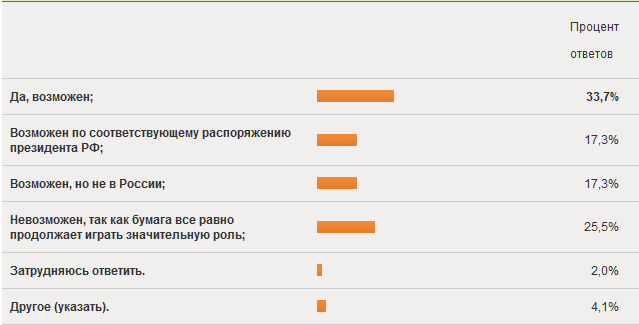
Among the factors hindering the transition to paperless technologies, our respondents highlight stupidity, laziness and greed first of all (68.4%), as well as insufficient awareness of potential users about electronic document management and electronic document storage technologies. Poll participants consider the imperfection of current legislation (57.1%), the fear of losing important documents (44.9%), the high cost of technical and software solutions (30.6%), and the inability to ensure a sufficient level of confidentiality when working with electronic documents (21.4%). When answering this last question, respondents who chose the item “Other (specify)” gave the largest variety of options. They talked about conservatism of thinking, and about the unwillingness of staff to study, and even about corruption ... They also wrote that most of the systems on the Russian market are imperfect (by the way, I would like to receive detailed comments on this item). Another respondent pointed out the unintuitiveness of the interfaces of the software used.
Some think more globally and give reasons of a more global nature: government policy, Russia, etc., etc. However, we can hardly agree with supporters of such a radical stance: most of the answers to this question differ little from those given by participants in similar surveys in Europe.
What, in your opinion, prevents the spread of paperless technology?
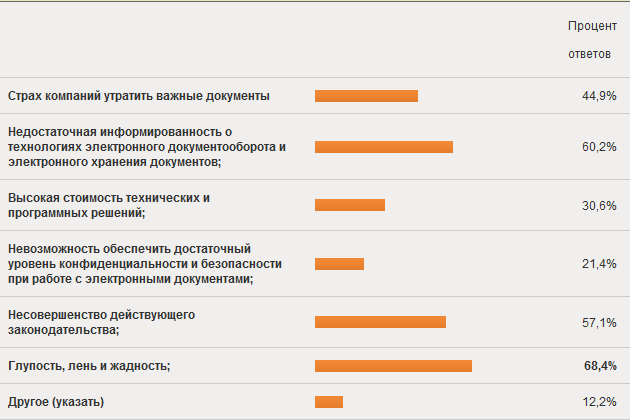
The data obtained during the survey, in our opinion, quite adequately reflects the situation: many of the realities of the paper era are already morally obsolete, but they still do not leave the stage, and new “digital” practices of working with documents have not yet taken shape. Moreover, the data obtained do not disagree with the results of surveys conducted in Europe and the USA.
I would like to hope that very soon the time will put everything in its place, the imperfections of the legislation and the notorious stupidity, laziness and greed will be overcome, and paperless technologies will finally start working for the benefit of people.
Source: https://habr.com/ru/post/160429/
All Articles